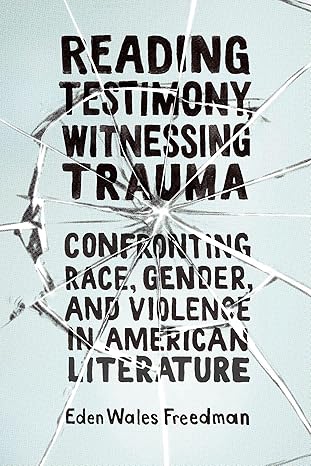
Reading Testimony, Witnessing Trauma:Confronting Race, Gender, and Violence in American Literature
by: Eden Wales Freedman (Author)
Publisher: University Press of Mississippi
Publication Date: 2020/2/28
Language: English
Print Length: 244 pages
ISBN-10: 1496827341
ISBN-13: 9781496827340
Book Description
Winner of the 2020 Eudora Welty PrizeTheorists emphasize the necessity of writing about―or witnessing―trauma in order to overcome it. To this critical conversation, Reading Testimony, Witnessing Trauma:Confronting Race, Gender, and Violence in American Literature treats reader response to traumatic and testimonial literature written by and about African American women and adds insight into the engagement of testimonial literature. Eden Wales Freedman articulates a theory of reading (or dual-witnessing) that explores how narrators and readers can witness trauma together. She places these original theories of traumatic reception in conversation with the African American literary tradition to speak to the histories, cultures, and traumas of African Americans, particularly the repercussions of slavery, as witnessed in African American literature. The volume also considers intersections of race and gender and how narrators and readers can cross such constructs to witness collectively. Reading Testimony, Witnessing Trauma’s innovative examinations of raced-gendered intersections open and speak with those works that promote dual-witnessing through the fraught (literary) histories of race and gender relations in America. To explicate how dual-witnessing converses with American literature, race theory, and gender criticism, the book analyzes emancipatory narratives by Sojouer Truth, Harriet Jacobs, and Elizabeth Keckley and novels by William Faulkner, Zora Neale Hurston, Margaret Walker, Toni Morrison, and Jesmyn Ward.
About the Author
Winner of the 2020 Eudora Welty PrizeTheorists emphasize the necessity of writing about―or witnessing―trauma in order to overcome it. To this critical conversation, Reading Testimony, Witnessing Trauma:Confronting Race, Gender, and Violence in American Literature treats reader response to traumatic and testimonial literature written by and about African American women and adds insight into the engagement of testimonial literature. Eden Wales Freedman articulates a theory of reading (or dual-witnessing) that explores how narrators and readers can witness trauma together. She places these original theories of traumatic reception in conversation with the African American literary tradition to speak to the histories, cultures, and traumas of African Americans, particularly the repercussions of slavery, as witnessed in African American literature. The volume also considers intersections of race and gender and how narrators and readers can cross such constructs to witness collectively. Reading Testimony, Witnessing Trauma’s innovative examinations of raced-gendered intersections open and speak with those works that promote dual-witnessing through the fraught (literary) histories of race and gender relations in America. To explicate how dual-witnessing converses with American literature, race theory, and gender criticism, the book analyzes emancipatory narratives by Sojouer Truth, Harriet Jacobs, and Elizabeth Keckley and novels by William Faulkner, Zora Neale Hurston, Margaret Walker, Toni Morrison, and Jesmyn Ward.
 Wow! eBook
Wow! eBook

